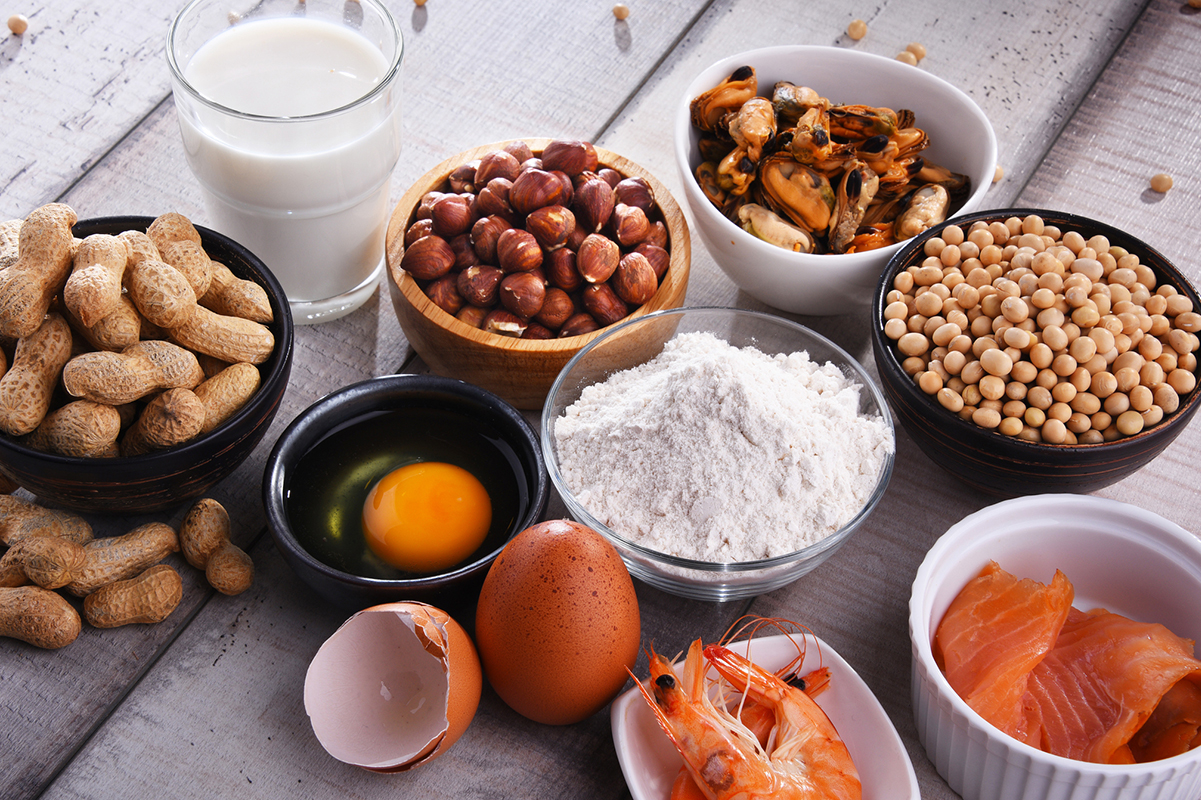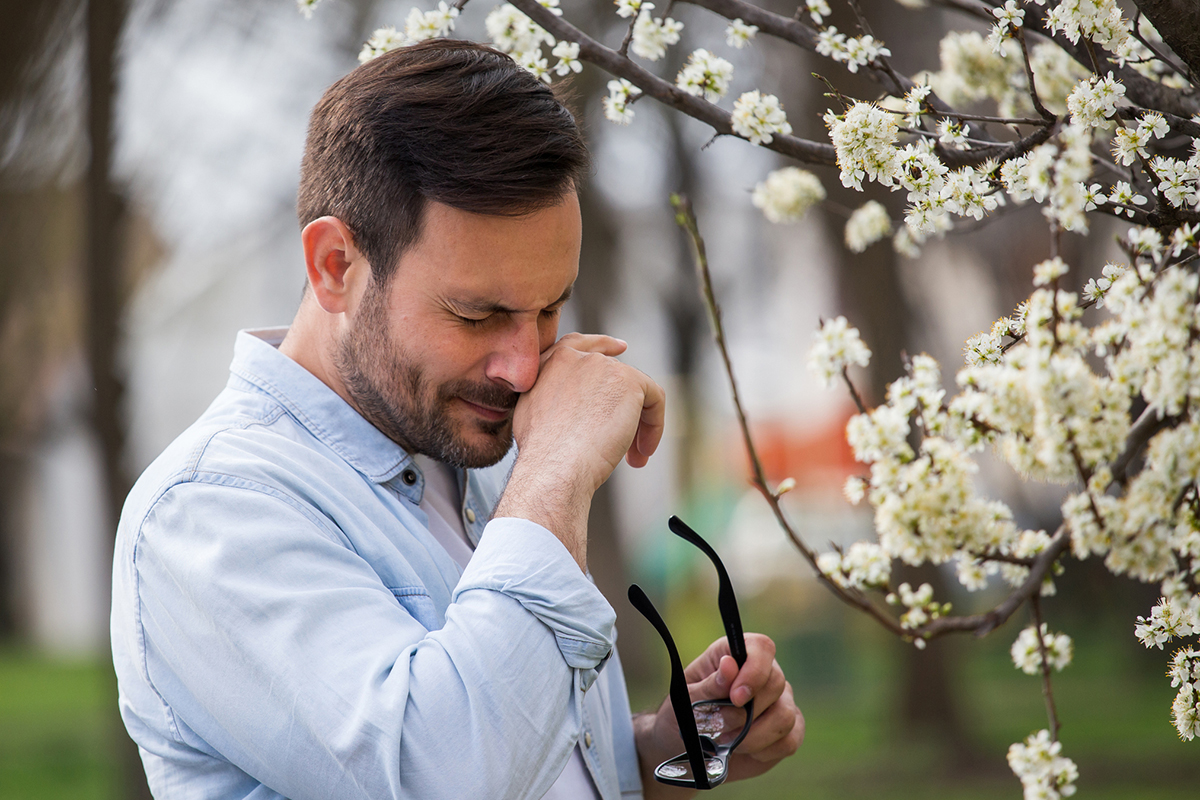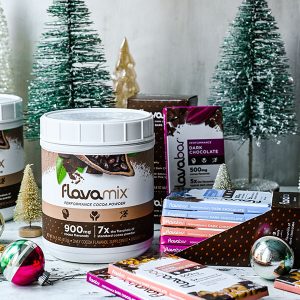Seasonal allergies and food and chemical sensitivities can all contribute to chronic nasal congestion, runny nose, sneezing, headache, itchy skin and eczema. Though traditional antihistamines and decongestants may be effective in the treatment of some or all of these symptoms, they also can have profound effects on quality of life due to their common side effects. Sedation and decreased mental clarity may be the most common consequences, but these pharmaceuticals can potentially cause heart dysrhythmias and have multiple interactions with a number of other medications. Additionally, many patients report that their symptoms are only partially alleviated with these treatments.
Allergic reactions such as nasal congestion have a very specific mechanism of action. Mast cells release histamine—a nitrogen-based compound that constricts bronchial smooth muscle and dilates blood vessels in response to injury and inflammation. The dilation of the blood vessels in the nasal passages coupled with the smooth muscle contraction makes the nasal mucosa “leaky” and is partly responsible for the resultant swelling of and rapid fluid leakage into the nasal mucosa. The IgE receptor on the mast cell binds to an allergen (allergic particle). Pharmaceutical antihistamines block the effects of histamine. However, the aforementioned side effects such as sedation, dizziness, cardiac dysrhythmias, tinnitus, altered mental clarity and gastrointestinal distress may make them less than optimal choices for treatment of allergic symptoms.
Alternatives to traditional pharmaceuticals fall into one of two categories.
Desensitization, which we do via skin testing and treatment with sublingual drops, can be extremely effective for the treatment of inhalant and chemical allergies. Additionally, it offers a hard-to-find alternative for the treatment of symptomatic food allergies. We often test and treat for candida sensitivity because this can exacerbate allergic symptoms. Patients only need to revisit our center every three months to recheck their endpoints via skin testing. Children are both tested and treated with sublingual drops alone.
Certain supplements can be used alone or in combination with similar efficacy and significantly fewer, if any, side effects as traditional antihistamines and decongestants. Fish oil, MSM, nettles, bromelain, quercetin, vitamin C, olive leaf extract and transfer factor are typical ingredients in our anti-allergy protocol. Ideally, they should be administered under the guidance of a medical professional as their efficacy is due to the fact that they have legitimate antihistamine and decongestant properties that in some cases mimic their pharmaceutical counterparts.
Fish oil is a broad-spectrum anti-inflammatory that can mute inflammation in the bronchi and nasal passages.
MSM (methylsulfonylmethane) is a sulfur derivative that can be such a potent anti-inflammatory that it can help alleviate arthritic pain.
Nettles (urtica dioica) actually contains histamine. It seems counterintuitive that ingesting histamine would alleviate allergic symptoms. However, histamine acts as a local hormone that modulates the immune response. Acute allergic reactions do not correlate with high plasma histamine levels. Low plasma histamine, though, has been linked to severe reactions to inhalant antigens. Seemingly, there’s a significant difference in the implications of a localized release of histamine and systemic blood levels. Nettles also contain serotonin and acetylcholine, two potent neurotransmitters.
Bromelain is a protein-digesting enzyme derived from pineapple stem. It acts as both an antitussive (cough suppressant) and a mucolytic (reduces the viscosity of sputum). Its mechanism of action is based upon the body’s inflammatory reaction cascades. Nasal tissue swelling and irritation is partly secondary to the release of fibrin. Fibrin sequesters an area of inflammation. This decreases circulation and tissue drainage resulting in swollen nasal mucosa. Swelling is worsened by the concomitant release of kinins, which increase the permeability or leakiness of blood vessels. Bromelain serves to block both fibrin and kinins.
Vitamin C appears to block histamine. It can be used intranasally and well as orally to treat nasal congestion.
Olive leaf extract has anti-viral, anti-fungal and anti-bacterial properties. It can have a role in allergy symptom prophylaxis as well as in the treatment of acute flare-ups.
Transfer factor is a potent colostrum-derived immunity enhancer that should only be taken under the supervision of a health care practitioner. Enhanced immunity can have a profound effect on chronic allergy signs and symptoms.
There is a broad array of treatment strategies for allergic patients. However, a large number of patients undergo years and years of various shots, vitamin supplementation and diet regimens with less than optimal results. A methodical, stepwise approach that addresses both skin testing via the provocation/neutralization method coupled with the proper diet, and nutrient and supplement protocols can effectively improve most patients’ treatment plans.






